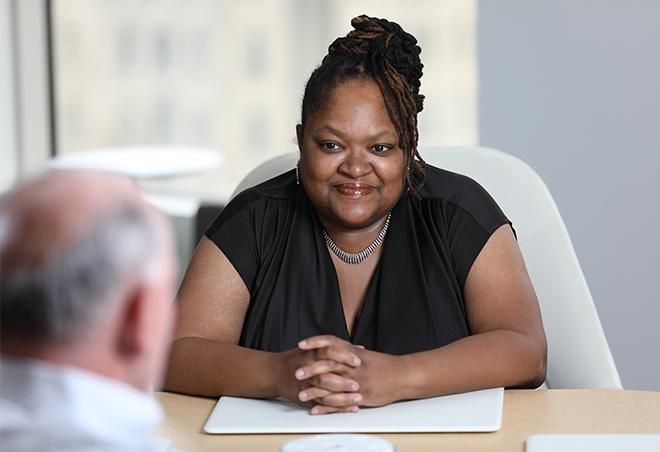Building the Bridge to a Better Life
How a Georgia-Pacific lawyer helped a deserving Georgia woman earn a pardon – and a new start
Close friends and coworkers know Gwen Boyd-Willis as a woman of faith. They call her “The Bridge” in her ministry because she's always there to connect people in their time of need.
“I help people get the help that they need,” Gwen said. “If I can't help you, I'll find somebody that can.”
But before becoming The Bridge, Gwen needed a few bridges of her own back to society after serving time in prison. She’s the first to admit her mistakes: She was arrested in 2005 after using a card left in an ATM to withdraw money and make purchases. Prosecutors initially charged Gwen with nine offenses, but reduced them to four after she cooperated with their investigation.
She was sentenced to four months in a women's detention center and then 10 years of probation. Gwen knew she needed to turn her life around, and set out to do it — earning a bachelor’s degree in criminal justice administration and master’s degrees in religious studies and divinity. But despite her achievements, she still struggled to find full-time employment due to her criminal record. “I missed out on a lot of great jobs,” she said. “It’s that stigma that’s attached to it, I guess.”
Just last year, when she applied to be a counselor at a youth detention center, Gwen got as far as interviews for the position — and then no further. “They loved me,” she said, recalling that they were going to hire her, “but when my record came back, they couldn’t.” She’s been working part-time as a chaplain for an employee well-being provider, but wanted to make an even bigger impact.
“I just didn’t give up,” Gwen said. She’d learned about the Georgia Justice Project, a nonprofit that works to provide legal representation and tools, and decided to apply for assistance to help clear her record. The organization selected her case out of a stack of many.
Assigned to her case: Michael Davis, a longtime attorney with Georgia-Pacific in Atlanta. Michael volunteered his time as part of Koch Industries' companywide pro bono initiative to expand justice opportunities for all in the communities where we operate. Over the last year, Koch employees provided more than 470 pro bono hours of service. More than a quarter of Koch’s legal team is involved, and the effort is expanding across the United States and United Kingdom.
“It’s the right thing for us to do, both as Georgia-Pacific and as a larger Koch company,” Michael said. Practicing law for nearly four decades, he knew about the barriers that people like Gwen face even after they’ve served their sentences. Before Michael’s 28 years at Georgia-Pacific, he’d worked for the state prosecutor’s office. “Granted, that was many, many years ago, but the system has not changed all that much,” he said.
Michael saw Gwen’s persistence when they met to review her case in early 2019. “As we were working through this, she had a great attitude," he said. "When I said, ‘Gwen, we need this,’ she would go out and get it. The perfect client.”
Michael felt good about the likelihood of securing a pardon, even though the state has granted fewer of them in recent years and had already denied Gwen’s applications twice.
Every three weeks or so, Michael and Gwen would meet at Georgia Justice Project’s headquarters, poring over documents and drafts for hours on end. They finally submitted for her pardon earlier this year, only to find the COVID-19 pandemic had slowed the process with the State Board of Pardons and Paroles. And so, they waited, as Michael kept tabs on minute developments, helping his client navigate the ins and outs of the process.
Then, in early August, a letter arrived in Gwen’s mailbox, more than a year and a half after she first met with Michael. On her third attempt, at long last, her pardon was granted.
“When I received that letter, I cried for about 30 minutes. And I've just been sharing with a lot of people that were great supporters during that time for me. So, I'm still in awe,” Gwen said. “I'm just thankful and grateful that the board decided to give it to me, because I worked so hard. I'm not the same person today that I was 15 years ago anyway. I'm glad I don't have it hanging over my head anymore.”
As Gwen ponders her next move amid uncertainty from the pandemic, she still works part-time as a chaplain.
“I felt good the system worked for her, to know that she could now have an opportunity to go out and find full-time work like she wanted in her chosen field,” said Michael, who is now exploring recent changes in state law that might enable Gwen to get her records sealed. That would open the door to even greater job opportunities and fulfillment.
Seeing so many doors closed, Gwen said, “could tear a person down to where they're not going to try again and they're going to give up.” Getting through the rough parts, she said, is equal parts mindset and perseverance.
As Gwen puts it: “Are you going to continue to try to strive and not take 'no' for answer? Are you going to let them tell you, ‘You can't have this job,’ and you're going to accept it and not try to keep moving forward?”
She wants to be an example for others facing similar circumstances, to be their bridge.
“I would just try to help walk with them. Walk through the process. That's just the kind of person that I am. I would try to help them myself,” Gwen said. “If I can't do it, I'll find somebody that can, and refer them. And stay in contact with them to try to see the process all the way out, because that's what most people need: support.”






